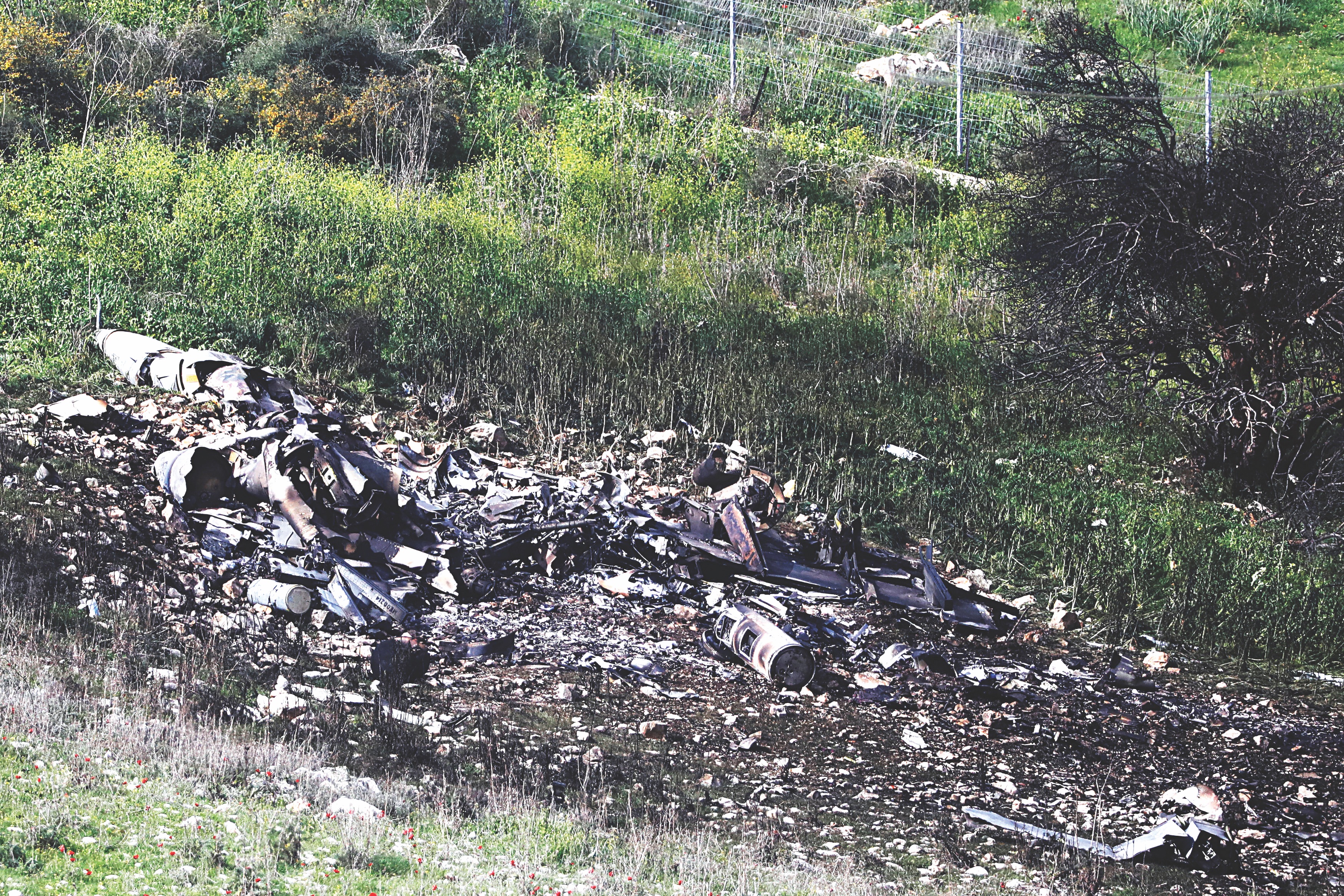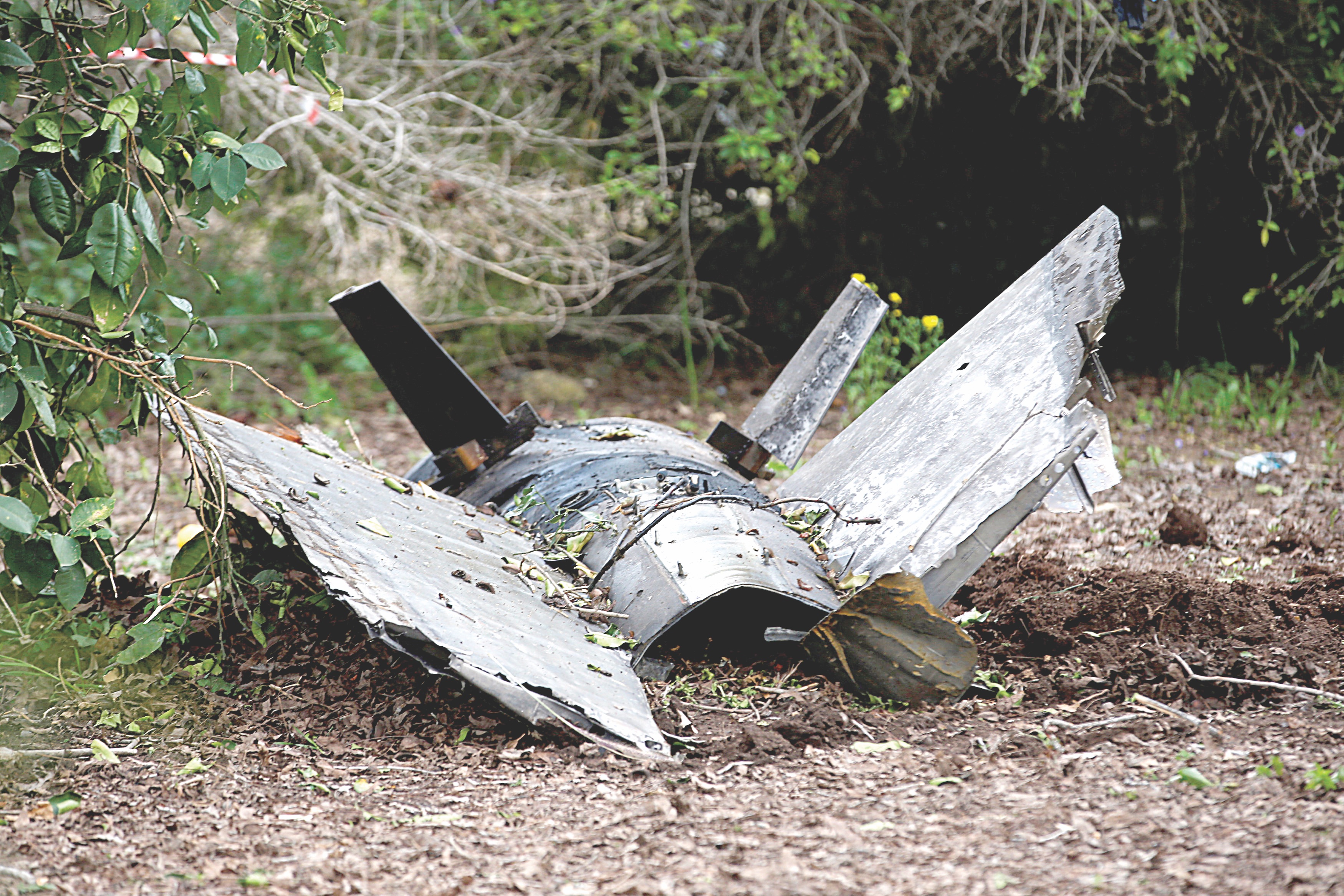 The remains of an F-16 Israeli war plane can be seen near the Israeli village of Harduf February 10, 2018. REUTERS/ Ronen Zvulun
The remains of an F-16 Israeli war plane can be seen near the Israeli village of Harduf February 10, 2018. REUTERS/ Ronen Zvulun Israel demonstrated how serious it is about preventing the establishment of an Iranian stronghold in Syria
1982 was the last year an Israeli fighter jet was downed by Syrian forces. 1982 was the last year Israel launched a large-scale attack in an area under Syrian control. 1982 was a year of war — the first Lebanon war — in a Middle East that was much different than it is now. Syria was still a real country with a real government. Israel’s main enemy in the north was still the PLO — the forces of Yasser Arafat. Iran was engaged in a long and bloody war — with Iraq. The Soviet Union was engaged in a Cold War with the much stronger United States.
There is very little we can learn today about the state of affairs to Israel’s north from what happened in 1982. Still, people have short memories but militaries have long ones, and thus the ghosts of 1982 live in the minds of some of those engaged in the current battle for power. Syria, by taking down an Israeli F-16 on Feb. 10, celebrated a small victory over the air force that downed 88 of Syria’s fighter jets in 1982. The Russians had their own reason for a small celebration: The 19 ground-to-air systems destroyed in June 1982 during one of Israel’s most brilliant military operations were Russian (or Soviet, as it was called then). The missile downing the Israeli jet last weekend was Russian.
A phone call between Israeli Prime Minister Benjamin Netanyahu and Russian President Vladimir Putin put an end to Feb. 10’s large-scale Israeli attack in Syria.
Before diving into an analysis, let’s recap the events. On Feb. 10, Iran sent a drone into Israel. Israel was well prepared, and an air force helicopter downed the drone. Then Israel attacked and destroyed the control vehicle for the drone, placed in a Syrian base in southern Syria, far away from the Syria-Israeli border. Iranian soldiers were killed.
Syria responded with a barrage of anti-aircraft missiles and hit one Israeli fighter jet. Its crew ejected over Israel’s Galilee, and one of the pilots was seriously wounded and is still in the hospital. Israel expanded its counterattack, targeting about a dozen Syrian and Iranian military installations in Syria. An Israeli air force general called this “the most substantial attack since 1982.” Then came the phone call from Putin. Israel pulled back. The sirens were silenced. The north quieted yet remained tense. The next round — as the cliché goes — is “only a matter of time.”
It is a matter of time because the issue at hand is not yet settled. Syria, after many years of civil war, is barely an independent country. And as that war winds down, a new war has begun — the one over future arrangements in this area. Iran — the country without which Syrian President Bashar Assad could not survive — wants its reward. It wants to establish a stronghold in Syria, right on Israel’s border. Russia — the country that enabled Assad’s survival — keeps a watchful eye over Syria to serve its own interests. Hezbollah, whose takeover of Lebanon is a prototype and a warning of what might happen in Syria, is freer today than it was during the busy days of the civil war.
Miscalculation that leads to a war with Syria or Iran is one thing. Miscalculation that leads to a war with Russia, when the U.S. stays on the sidelines, is quite another.
Israel vowed to prevent such developments. It vowed to prevent Iran from establishing another stronghold to its north. It vowed to prevent Iran from building in Syria an infrastructure that could serve to threaten Israel. Obviously, vowing alone is not enough. In the Middle East, one has to back words with action, one has to use power to make a point. And when Iran provided a pretext for attack, by invading Israeli territory with its drone, Israel jumped at the opportunity.
This was not a minor incident. Israel and Iran had been having a proxy war for many years, but this time there were no proxies. It was an Iranian drone, these were Iranian soldiers, it was Iranian equipment that Israel attacked. True — the Israeli jet was downed by Syria (acting, according to some reports, under heavy pressure from Tehran). Still, the shadow war is no longer shadowy. It is out in the open, with both countries — Iran and Israel — having to ponder the impact of their clashes on the many other components of an unstable situation.
The impact is never quite known in advance; there are only probabilities and educated assessments. Israeli investigative journalist Ronen Bergman, in his newly released best-seller, “Rise and Kill First” — a detailed book about Israel’s expert trade of targeted killings — recounts a few instances of miscalculations, some concerning Israel’s war with Iran. When Tamir Pardo, the head of Israel’s spy agency, Mossad, returned from a trip to Washington,. D.C., in 2012, he “warned Netanyahu that continued pressure on the United States would lead to a dramatic measure, and likely not the one that Netanyahu hoped for,” Bergman writes. Pardo believed that Netanyahu’s implied threat to attack Iran pushed then-American President Barack Obama to sign a deal with Iran. “Obama, fearing Israeli action, agreed to an Iranian proposal to hold secret negotiations,” Bergman writes. He speculates that “if the talks had begun two years later, Iran would have come to them in a considerably weaker state.” That is to say: Bergman assumes that Israel miscalculated in applying too much pressure on the U.S. to tame the Iranian threat.
Bergman’s argument concerning this incident can be a matter for debate, mainly because it doesn’t fully take into account Obama’s great interest in having a “historic” breakthrough with Iran before leaving office. But Bergman’s overall theme still stands: Israel makes decisions and takes action without always being able to rightly asses the ultimate outcome of its decisions. The alternatives — never to take action or to make decisions only when the outcome is predetermined — is nonexistent. In the rough business of war, a measure of risk is a given. Israel’s willingness to take risks is one of the tools in its arsenal of deterrence. In such context, its attack last weekend should be seen as a down payment of seriousness. If anyone was hoping that Israel would not have the stomach to get into a fight and risk a full-scale war in the north, one has to recalculate.

The shadow war is no longer shadowy. It is out in the open, with both countries — Iran and Israel — having to ponder the impact of their clashes on the many other components of an unstable situation.
Israel miscalculated many times, but so did its enemies. Quite famously — and here’s just one example — when Hezbollah inadvertently prompted the second Lebanon war by abducting Israeli soldiers. Had it known in advance that war would be the result, Hezbollah’s leader admitted later, the soldiers would still be alive and well. That was more than a decade ago, and its impact on Israel’s rivals might have faded. An aggressive approach is thus essential not to ignite war but rather to prevent one — make Iran understand that this is where the current path leads, make it realize that it cannot count on Israeli laxity.
Russia is the other addressee of this message of seriousness. For the past couple of years, since the Russians decided to jump into the Syrian mess — a bet that thus far proved solid and worthy (Obama’s grave predictions of “Russia’s Vietnam” notwithstanding) — Israel and Moscow proved meticulous in coordinating their actions in the region and prevented misunderstanding or an unintended clash. This was complicated and sometimes restrictive but mostly tactical: Israel lost flexibility in prompting combat; Russia left enough maneuver room for Israel to take effective action.

This worked, awkwardly, when the Syrian civil war was still going on, the players in Syria were busy fighting one another. It is less clear how Russia and Israel can manage this situation when the civil war is (almost) over, and when the battle turns to become one of Israel against any attempt at Iranian expansion.
This calls for strategic understanding, not just the tactical prevention of unintended clashes. But can Israel and Russia reach an agreement on the future of Israel’s border with Syria? For Israel, the goal is clear: to have no Iranian forces, and no forces under Iran’s control, near its border; and to be able to tame any attempt by Iran to turn Syria into an active front against Israel, Lebanon-style. For Russia, the goals are always somewhat murky: It wants Assad to survive, it wants its military bases in Syria safe, it wants to keep the Iranians happy (but not too happy) and quiet. Russia probably doesn’t want to have to take responsibility for a war between Israel and Iran.
Russia also has to take the U.S. into account. But how worried is it, considering the realities of the past couple of years? Not that long ago, Israel rarely questioned the basic commitment of the U.S. to contain Russia in the Middle East. The arrangement was clear to everybody: When the need arises, Israel deals with neighborhood sharks — small sharks and sometimes even with midsize sharks such as Iran — as long as the U.S. makes sure that no big shark, no great white shark such as Russia, interferes to tip the balance against Israel. In 1973, Israel fought against Egypt and Syria, and the U.S. was ready to clash with the Soviet Union in case of intervention. Regional power against regional power — superpower against superpower.
Putin on the one side and American presidents Obama and Donald Trump on the other side proved this assumption to be risky, maybe invalid. In 2008, Russia invaded Georgia. In 2014, it invaded Crimea. In the summer of 2015, it sent its forces to Syria. Obama was ineffective in his response. Maybe he just didn’t care. In 2016, Trump was elected, communicating a mixed message of standoffishness and aggressiveness. Unlike Obama, Trump made good on his word and launched a Tomahawk missile attack in Syria when reports of the use of chemical weapons tested his resolve. Like Obama, Trump steered clear of getting involved in the managing of postwar Syria and seemed to accept the Russian-dominated status quo.
This leaves Israel confused and unsure. Miscalculation that leads to a war with Syria or Iran is one thing. Miscalculation that leads to a war with Russia, when the U.S. stays on the sidelines, is quite another. Bergman, on a tour of the United States to promote his book, told me on Feb. 13 that Israel “has pleaded the United States to exert its influence over Russia, which is the only country that can pressure Iran, to prevent the stationing of permanent Iranian forces in Syria and the establishment of an Iranian military seaport. All in vain.” It also failed to convince Russia directly to tame Iran. Putin, Bergman told me, “is not interested in entering into a dispute with the Iranians and he has not interfered with their deployment in Syria.”
So, Israel is left with no choice but to up the ante and signal to all parties involved that war is an option. It has no choice but to signal to all parties involved that dithering and allowing inertia is not an option. “After it failed to recruit the Trump administration to convince Putin, Israel feels that it has remained alone, and in this situation it will respond very aggressively,” Bergman told me from New York. It already has, and is ready to act again. Worst-case scenario: This leads to real, long and bloody war, involving Iran and Israel, Syria and possibly Russia — a war that Israel’s military already has a name for: the first northern war.
No doubt, this will be a costly enterprise for all sides involved, the result of which is unknown. No doubt, it is a war Israel would like to avoid. And indeed, this is the best-case scenario: Signaling seriousness and readiness to go to war, Israel hopes to prompt Russian and possibly American involvement in halting Iran’s advancement. Such a move is the only one that will make a first war of the north obsolete.
Shmuel Rosner is senior political editor. For more analysis of Israeli and international politics, visit Rosner’s Domain at jewishjournal.com/rosnersdomain.






















 More news and opinions than at a Shabbat dinner, right in your inbox.
More news and opinions than at a Shabbat dinner, right in your inbox.